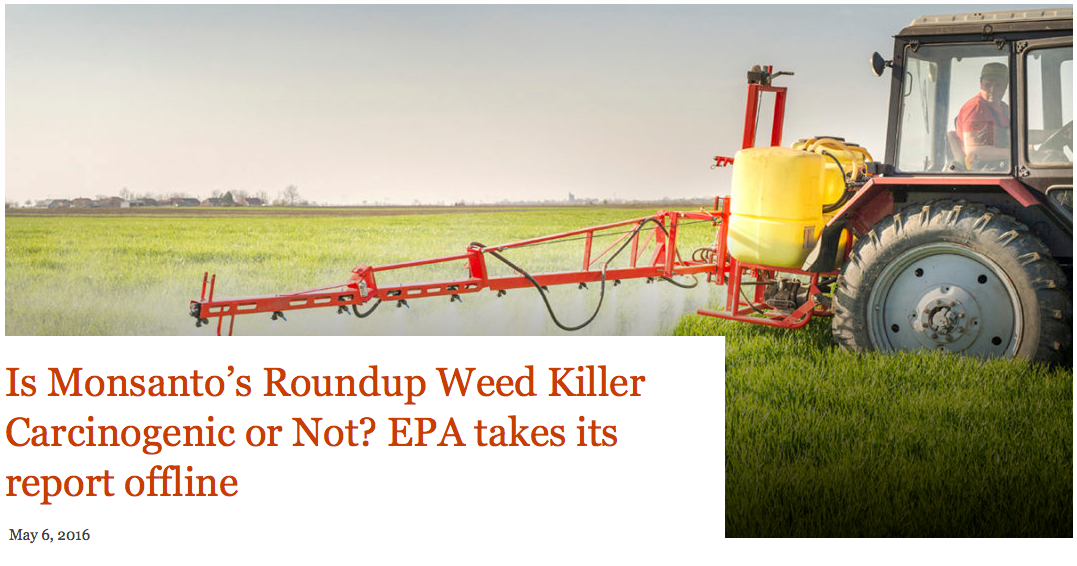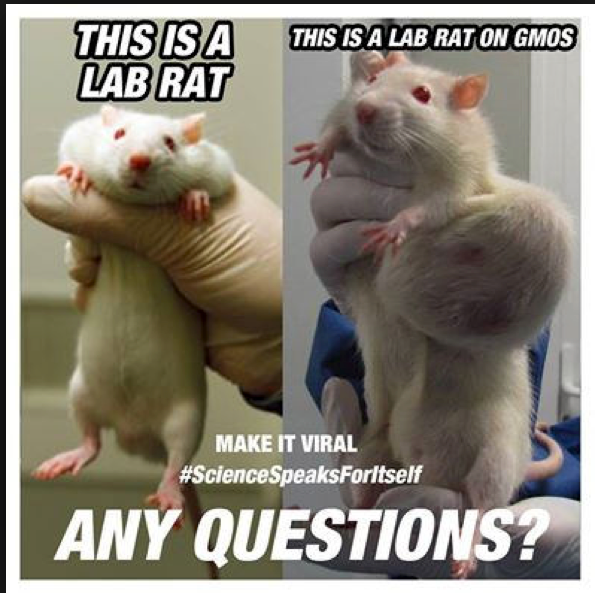General Discussion
Related: Editorials & Other Articles, Issue Forums, Alliance Forums, Region ForumsEPA removes report that glyphosate does not cause cancer from its website. " Carcinogenic or Not?"

Reuter reports that the regulatory agency took down the report as well as the other documents because they were not final. In a clarificatory email, EPA explained that the 86-pages report has been published “inadvertently” and that their review of the chemical has not been finished yet. However, the report was dated Oct. 1, 2015, was labeled as “final Cancer Assessment Document”, with the word “FINAL” being clearly printed on every single page of the document. In their report, the EPA allegedly claimed that glyphosate, the ingredient found in Monsanto’s common herbicide Roundup, was “not likely to be carcinogenic to humans.”
On the other hand, the International Agency for Research on Cancer (IARC) on its latest report, classified glyphosate as “probably carcinogenic to humans (Group 2A),” raising several controversies. During his recent interview on Here & Now, Monsanto CEO Hugh Grant insisted on claiming that Roundup is not carcinogen for humans. “It’s 40 years old,” he said, explaining how “virtually every year of its life it’s been under a review somewhere in the world by regulatory authorities.” Monsanto keeps claiming that the EPA’s document should be issued as an “official classification” while the regulator responded that their cancer review is not complete and that it will be peer reviewed by the end of 2016.
http://trofire.com/2016/05/06/glyphosate-carcinogenic-not-epa-takes-report-offline/
Buzz Clik
(38,437 posts)The real answer is unlikely but uncertain.
womanofthehills
(8,657 posts)McCall shunned pesticide use on his farm, except for the herbicide called Roundup - marketed by Monsanto as having extremely low toxicity. He used Roundup regularly, spraying it himself around the farm to drive back worrisome weeds. He even recommended Roundup to friends, telling them it was supposed to be much safer than alternatives on the market, and touting its effectiveness.
But now in his death, McCall is one of several plaintiffs in more than a dozen lawsuits that claim the active ingredient in Roundup - a chemical called glyphosate - gave them cancer, and that Monsanto has long known glyphosate poses “significant risks to human health, including a risk of causing cancer.”
The lawsuits, brought by plaintiffs in California, Florida, Missouri, Delaware, Hawaii, and elsewhere over the last several months, claim Monsanto has hidden evidence, and manipulated regulators and the public into believing in the safety of glyphosate, which annually brings in about $5 billion, or a third of total sales, for the agribusiness giant. Like McCall, many farmed, or worked in agricultural jobs in which they regularly were using or exposed to glyphosate.
http://www.huffingtonpost.com/carey-gillam/what-killed-jack-mccall-a_b_9852216.html
Humanist_Activist
(7,670 posts)I guess we shall see whether the science will support their claims.
womanofthehills
(8,657 posts)Igel
(35,270 posts)had a severe conflict of interest.
You know, those conflict of interest things that in the case of industry automatically disqualify any information in a nuclear burst of ad hominem thinking, but in the case of anti-industry advocates qualify as a nimbus to bless their every sound.
And later the IAC chair came back to testify against glyphosate because, well, he'd done research with a specific point of view for anti-industry groups. Follow the money? Nah.
The European report came to the same conclusion as the EPA report, that glyphosate was very unlikely to be carcinogenic, and asked the IARC to discuss the matter. IARC declined. But now that the science has spoken, the source of all true knowledge, ideology and politics (of the right sort) must weigh in.
I can only imagine the EPA and FDA's report on electromagnetism, dated 1835. "This technology, untried, may prove a hazard to human life. Since it affects iron, found in human blood, the conclusion is inescapable that it will adversely affect humans. Moreover, it will have profound implications for the economy of the US and create severe disruptions. Therefore, to protect human and economic health of the nation, we are proposing strict regulation on the use of magnets and requiring licensing for wire suitable for producing so-called 'generators' and anti-labor 'motors'. Production facilities for both will be closely monitored by a series of agencies, once the appropriate regulations are drawn up. The first draft to result from this lengthy process is expected to be ready for review no later than 1845, at which time the initial review process will begin and longitudinal trials may begin." There'd be labor groups in the US protesting Joseph Henry and calling for the out-right banning of dangerous experiments using that dangerous force that spans open air and could only serve to make the elites' lives cushier while putting commoners out of work, and fundamentalists claiming that demons must be responsible for the force that magnets produce and the resulting electricity. Lenz, of course, would be ousted from his position in Germany, and Faraday's establishment would be burned down.
womanofthehills
(8,657 posts)It was supposedly it's FINAL Report - dated Oct 1, 2015. Lawsuits are beginning because of WHO's International Agency for Research on Cancers initial report - this agency is also working on a final report.
Electromagnetism??? Give me a break!! You can avoid electromagnetism - it's hard to avoid contaminated food.
womanofthehills
(8,657 posts)Major Pesticides Are More Toxic to Human Cells Than Their Declared Active Principles
http://www.ncbi.nlm.nih.gov/pmc/articles/PMC3955666/
Humanist_Activist
(7,670 posts)I find it interesting that you have huge problems with possible conflict of interest from other scientists, but when its someone who is openly biased, you believe them.
annabanana
(52,791 posts)cui bono?
womanofthehills
(8,657 posts)So I take it you prefer Monsanto's 90 day study to a non Monsanto researchers 2 yr study.
Initial Study
Ten things you need to know about the Séralini study
1. Most criticisms of Séralini’s study wrongly assume it was a badly designed cancer study. It wasn’t. It was a chronic toxicity study – and a well-designed and well-conducted one.
2. Séralini’s study is the only long-term study on the commercialized GM maize NK603 and the pesticide (Roundup) it is designed to be grown with. See here: Why is this study important?
3. Séralini used the same strain of rat (Sprague-Dawley, SD) that Monsanto used in its 90-day studies on GM foods and its long-term studies on glyphosate, the chemical ingredient of Roundup, conducted for regulatory approval.
4. The SD rat is about as prone to tumours as humans are. As with humans, the SD rat’s tendency to cancer increases with age.
5.Compared with industry tests on GM foods, Séralini’s study analyzed the same number of rats but over a longer period (two years instead of 90 days), measured more effects more often, and was uniquely able to distinguish the effects of the GM food from the pesticide it is grown with.
6. If we argue that Séralini’s study does not prove that the GM food tested is dangerous, then we must also accept that industry studies on GM foods cannot prove they are safe.
7. Séralini’s study showed that 90-day tests commonly done on GM foods are not long enough to see long-term effects like cancer, organ damage, and premature death. The first tumours only appeared 4-7 months into the study.
8. Séralini’s study showed that industry and regulators are wrong to dismiss toxic effects seen in 90-day studies on GM foods as “not biologically meaningful”. Signs of toxicity found in Monsanto’s 90-day studies were found to develop into organ damage, cancer, and premature death in Séralini’s two-year study.
9. Long-term tests on GM foods are not required by regulators anywhere in the world.
10. GM foods have been found to have toxic effects on laboratory and farm animals in a number of studies.
http://www.gmoseralini.org/ten-things-you-need-to-know-about-the-seralini-study/
womanofthehills
(8,657 posts)Scientist Who Discovered GMOs Cause Tumors in Rats Wins Landmark Defamation Lawsuit in Paris
http://www.march-against-monsanto.com/scientist-who-discovered-gmos-cause-tumors-in-rats-wins-landmark-defamation-lawsuit-in-paris/
